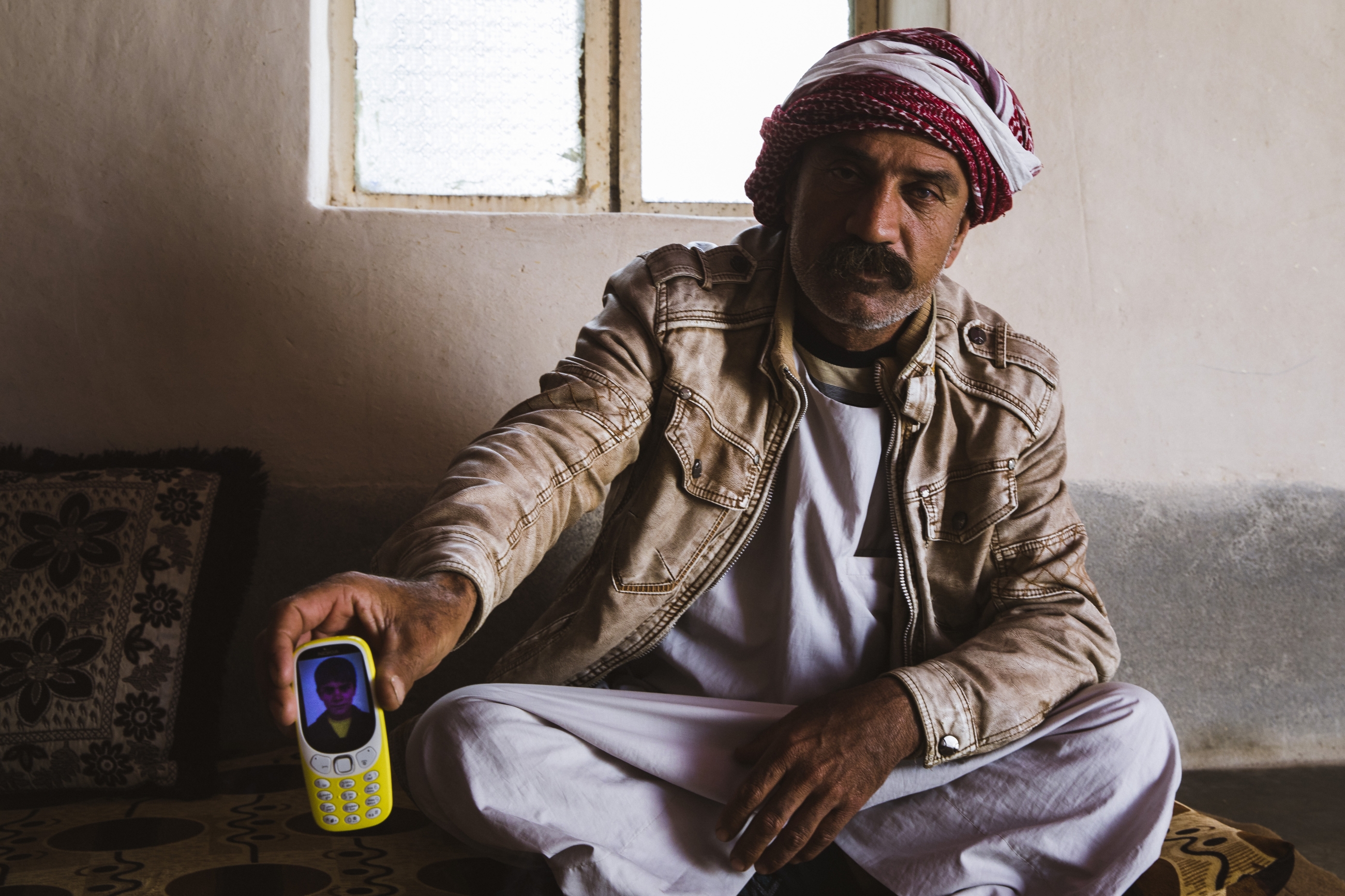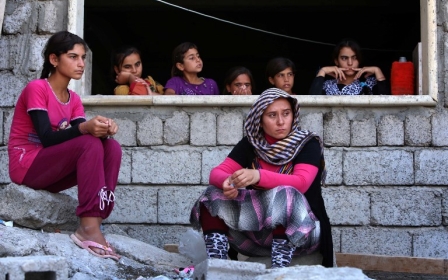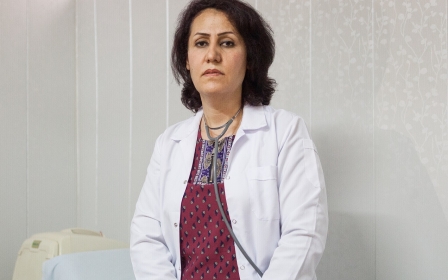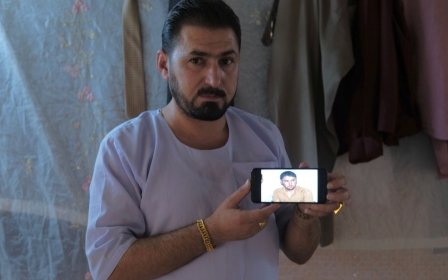'Caliphate Cub' survivor fights to save other Yazidis forced to join Islamic State

Sitting cross-legged on the floor of his humble family home, the crutches upon which he now relies propped against the wall, Sufian holds out his phone. A dated, school photo appears on the screen: his younger brother Perwesh, 16.
Sufian is a former "Caliphate Cub," a member of Iraq's Yazidi religious community who was forced to fight as part of the Islamic State (IS) group. Perwesh is still fighting with the militant group.
"He was so affected by IS brainwashing, he'd become completely radicalised and indoctrinated with the IS mentality," said 18-year-old Sufian, whose last name Middle East Eye agreed to withhold to protect him and his family.
"To be honest, I was afraid of him. Imagine that; I was afraid of my younger brother, but a lot of Yazidis brainwashed by IS killed their own brothers if they refused to convert."
When IS swept through northern Iraq in 2014, Sufian and Perwesh were amongst thousands of members of Iraq's Yazidi religious minority that were abducted from the town of Sinjar and surrounding areas.
New MEE newsletter: Jerusalem Dispatch
Sign up to get the latest insights and analysis on Israel-Palestine, alongside Turkey Unpacked and other MEE newsletters
Yazidi women were forced into sexual slavery, and young Yazidi boys like Sufian were indoctrinated with IS's strict interpretation of Islam and trained as fighters.
The last time Sufian saw Perwesh was in early 2017, on a front line near the Iraqi border with Syria.
"We had just 30 minutes together, but we couldn't talk about our family because he believed all Yazidis were Kaffir [unbelievers]. He urged me not to try and escape," Sufian told MEE.
'We were just children'
Sufian had already tried to escape from IS once, in 2015, with a small group of Yazidi friends. But they were captured, imprisoned and tortured, he said.
"They beat us a lot, especially on our feet, and accused of us being spies. I couldn't even stand up because of the pain. I was 15. We were just children and we were terrified," Sufian recalled.
He said IS decided to kill them, but an IS emir from Mosul intervened and instead put the boys through a year of intense Islamic indoctrination, before sending them to a military training camp in Syria's Hama province.
There, Sufian said they were trained by Uzbek, Russian, Chechen and Iranian-Kurdish commanders. The boys went through four hours of gruelling physical training every morning starting at 5am. After breakfast, they trained with assorted weapons and, after lunch, they were schooled in military strategy.
"They brainwashed me completely. I converted to Islam, I prayed five times a day," he said, adding that he was in a fragile mental state.
"Some Yazidis memorised the whole Quran and others became suicide bombers. One of my close friends underwent six months of explosives training and made bombs for IS."
At this point, Sufian's father, Rashid, a soft-spoken farmer, leans forward. Two boys from their extended family were suicide bombers during the battle for Mosul, he said, quietly.
Rashid told MEE he has 12 children, then corrected himself. "I have 13, but one is with IS," he said. "It's worse for our neighbours; they still have 20 family members with IS."
Two of Sufian's young cousins are also still in the hands of IS.
A 'living death'
After his training, Sufian said, he was sent to the front lines in Syria's Deir ez-Eor province.
"As a forced IS fighter, you die 100 times a day. Each day is like a living death," he said.
As part of the Katiba Shingal (Sinjar Brigade), in which each military position was manned by four IS fighters and two Yazidis, he fought in three major battles before being injured by an air strike on a border front line.
Although his broken leg was not a severe injury, with no functioning hospitals in the desert area the wound blackened and became gangrenous. His injury worsened by the day, Sufian said, forcing IS to help him seek medical treatment.
He said the militant group made him a fake Syrian identification card and two IS fighters took him to a Syrian-Kurdish hospital in the town of Hasakah, in the country's northeast. The IS members presented themselves as civilians at the hospital, telling staff Sufian was injured in an air strike, he said.
"I urgently needed a blood transfusion, but the hospital had no blood, so they sent the two IS guys out to get blood from somewhere," Sufian said.
"And then a commander from the PKK [Kurdistan Workers' Party, which is fighting IS in Syria] came to talk to me, and I told him in Kurdish that I was a Yazidi captive and the guys with me were IS."
The PKK fighter gave his own blood to save him, Sufian said, and his forces "dealt with" the two IS fighters when they returned. Sufian said he does not know what happened to them.
After a month in hospital, during which time his gangrenous leg had to be amputated at the thigh, Sufian was arrested by the predominantly Kurdish Syrian Democratic Forces (SDF) and imprisoned for 34 days.
His father visited him in prison, with childhood photos and proof of his identity, and eventually in March he returned to Iraq.
De-radicalising fellow Yazidis
Since his escape from IS, Sufian has been working to de-radicalise other Yazidis forced to fight for IS in Syria.
So far, he has managed to de-radicalise 14 boys and help to bring them home, he said. The Yazidi friend he helped most recently was smuggled out of Iraq just over a month ago.
"I hope the international community will help rescue the Yazidis still with IS and also understand that they were forced to fight with IS and they're not like real IS," Sufian told MEE.
The process of de-radicalising Yazidi boys who were forced to join IS's ranks can take between a month-and-a-half to two months, Sufian said.
He said the first step is connecting to the boys on WhatsApp, where they message back and forth in Arabic, as many of the Yazidis, forced by IS to speak only Arabic, have forgotten their Kurdish mother tongue or reject it as a kaffir [infidel] language.
Although many Yazidis who have been forced to fight with IS are on some of the group's final and most dangerous front lines, Sufian said the trust-building process cannot be rushed.
Crucially, Sufian tells the enslaved Yazidi boys that he is living proof that one of IS's main threats - which is used to keep them with the group - is a lie.
IS leaders tell the boys that any Yazidi who convert to Islam and fight with IS will, at worst, be killed by the Iraqi government, which routinely hands out the death penalty to former IS fighters, Sufian said. At best, Yazidis returning from IS will be rejected and outlawed by their own community, the militants say.
Instead, Sufian tells the boys that despite returning as a wounded, former IS fighter, he has been welcomed back into his family and home country, and is respected within his community - and they can be, too.
"Sufian has done amazing work and helped us a lot because he had been moved around many different locations, so he knew where a lot of the Yazidis were," said Shereen Shingal, a young woman who helps smuggle enslaved Yazidis out of Syria. "He talks to a lot of our boys in IS and helps to alter their mindset."
After IS, a new life of fear
Still, despite his efforts, Sufian has not been able to de-radicalise his own brother, and his family members say they don't know if they will ever see Perwesh again.
"I’ve tried talking to my brother, too, but it's hopeless. He is completely brainwashed," Sufian said.
And while Sufian was welcomed home after his escape from IS, adjusting to normal life has not been easy.
"I've done nothing since I came back. There's nothing to do," he said, flatly. "And I'm afraid to do anything or go anywhere because there are IS spies everywhere."
An international organisation made him a prosthetic limb in Iraqi Kurdistan. But other than that, Sufian said he has received no psychological help or support, and no one has ever spoken to him about his own de-radicalisation.
It's not safe for him to go out. And he has helped a lot of his friends in IS and this de-radicalisation work puts him at very great risk
- Rashid, Sufian's father
Meanwhile, Sufian's family has done everything it can to help him adjust to normal civilian life, but he remains wanted by IS, leaving his loved ones terrified the group might abduct him again.
One of the main roads running south from the northern Iraqi town of Baaj, where self-proclaimed Caliph Abu Bakr al-Baghdadi first called on people to join IS, runs close to the family's house.
"He is very much in danger. We never let him go out late because IS have spies everywhere," his father said.
An IS emir called him once, Rashid told MEE, saying they had tried to break Sufian out of the Hasakah hospital but were unable to penetrate the SDF's security. The emir warned him that IS wanted Sufian back.
"It's not safe for him to go out," Rashid said. "And he has helped a lot of his friends in IS, and this de-radicalisation work puts him at very great risk."
For Rashid, the only safe place for his son is abroad.
That's a sentiment echoed by Sufian himself. "To be honest," he said, "now I just want to leave Iraq."
This article is available in French on Middle East Eye French edition.
Middle East Eye delivers independent and unrivalled coverage and analysis of the Middle East, North Africa and beyond. To learn more about republishing this content and the associated fees, please fill out this form. More about MEE can be found here.




